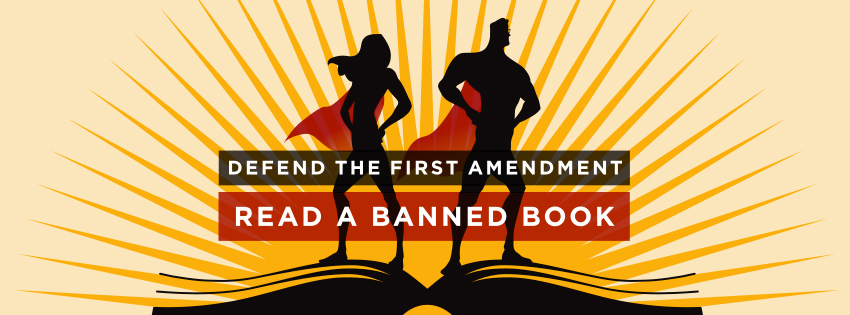The Unquiet Librarian: Freedom to read

Celebrating Banned Books Week
BY VIRGINIA ROBERTS
Director, Rhinelander District Library
 Last week Rhinelander District Library was pleased to make pocket-sized United States Constitutions available. Back when this country was founded, the Constitution, and other documents like it were considered dangerous—even treasonous (Yes, still. Check the history. The Brits didn’t give up so easily—this country is prime real estate). So, along with many other documents generated by this country’s founders, writings on freedom were banned in the English speaking world. Banning books isn’t unique to politics. The Puritans and many others banned all fiction because they were considered lies. One of the earliest American novels, Charlotte Temple, snuck in under the radar, because those reading this morality mess of a book felt it was truthful. This novel and its sequel are as sudsy as the last three seasons of Downton Abby, but the public ate it up. And frankly, many books get banned for this reason. People think others cannot separate fantasy from reality. Banning books and other printed materials isn’t a new idea. It’s older than our country, older than our apparent universal literacy brought about in public schools and by public libraries. Banned books come in every possible genre, every subject. Some are accurate, historically, scientifically—others, not so much. I won’t list them here. There are a number of excellent websites that will do that—and tell you why.
Last week Rhinelander District Library was pleased to make pocket-sized United States Constitutions available. Back when this country was founded, the Constitution, and other documents like it were considered dangerous—even treasonous (Yes, still. Check the history. The Brits didn’t give up so easily—this country is prime real estate). So, along with many other documents generated by this country’s founders, writings on freedom were banned in the English speaking world. Banning books isn’t unique to politics. The Puritans and many others banned all fiction because they were considered lies. One of the earliest American novels, Charlotte Temple, snuck in under the radar, because those reading this morality mess of a book felt it was truthful. This novel and its sequel are as sudsy as the last three seasons of Downton Abby, but the public ate it up. And frankly, many books get banned for this reason. People think others cannot separate fantasy from reality. Banning books and other printed materials isn’t a new idea. It’s older than our country, older than our apparent universal literacy brought about in public schools and by public libraries. Banned books come in every possible genre, every subject. Some are accurate, historically, scientifically—others, not so much. I won’t list them here. There are a number of excellent websites that will do that—and tell you why.
This upcoming week, Sept. 26 through Oct. 1 is Banned Books Week. Many don’t believe printed materials are really banned in this country. I’ll admit, it’s extraordinarily difficult to do, as there is seemingly access to everything. We’re very fortunate in the United States. Adults can get almost anything on the internet—newspaper, magazine, book—comic book, even—and a great deal is available through the library. We, in this country, as a logical extension of the First Amendment, have the freedom to read. And there is more out there to read every day—and it is your right and responsibility to think about your choices and choose wisely—but you get to choose.
But books are removed from public access on a regular basis. Why? Because some feel the purportedly dangerous ideas in books might encourage people to think or do things others find problematic. Just because the book is difficult to obtain doesn’t mean the ideas have disappeared—or in the age of Project Gutenberg and print on demand—the book itself. Books are, for the most part, accessible if you want them and know where to look. And it is very important to know where ideas originate.
But cultural values, political climate, or just simply controversial content—books and their ideas have been silenced over time, for reasons that seem simple, but are actually more complex and less obvious. You’ve probably read more than a few. I know I have—from the moment I could read. Silent Spring, A Wrinkle in Time, The Giver, Cat in the Hat, The Giving Tree, Sandman, and The Second Sex. Virtually all the books I read in high school had been banned in one place or another—and it didn’t end there. I read graphic novels. I read really old books banned because the “blood and thunder” pulp stories by Charlotte Perkins Gilman and Louisa May Alcott were not considered “literature” or frankly, ladylike. I read stuff considered controversial to see what they’re about. I continued to read them. The library is showing a film based on one of my favorites on Oct. 7 at 2 p.m. I invite you to see it and discuss why. You might think what banned the book was the racism—but that’s only part of the story in only part of the country. Then, it was removed from high schools for another reason. It’s now considered an American classic; still very controversial. See, simple, yet complex.
In Ray Bradbury’s Fahrenheit 451, he writes about a possible future where firemen burn books. In a culture where people are anesthetized by a screens, one that promotes closeness of relationships without anyone actually having to socialize—a fireman stops listening to the government and in danger of losing not only his job, but his life—begins reading the written material he was sent to burn. You see, Bradbury wasn’t just writing fiction—but trying to prevent a future where books, and the ideas within them, are no longer written down, discussed, talked about, and envisioned.
“You don’t have to burn books as a culture; just get people to stop reading them” —Ray Bradbury
That’s why Banned Books Week is so important. That’s why public libraries are important. There are ideas lurking about—and you just might find something worthy in them.
Leave a reply
You must be logged in to post a comment.





